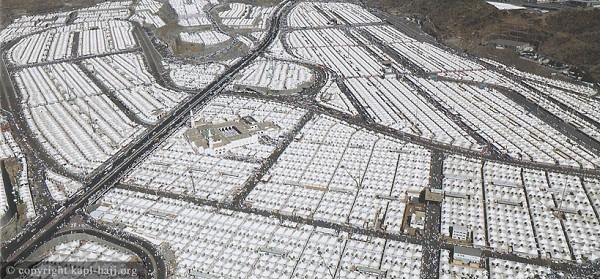
Iran refuses to sign Hajj agreement, bans own pilgrims
 Riyadh, (IINA) – Saudi Arabia’s Ministry of Hajj and Umrah announced on Thursday that the Iranian delegation had refused to sign an agreement laying out arrangements for this year’s Hajj, Saudi Gazette reported.
Riyadh, (IINA) – Saudi Arabia’s Ministry of Hajj and Umrah announced on Thursday that the Iranian delegation had refused to sign an agreement laying out arrangements for this year’s Hajj, Saudi Gazette reported.
The ministry said Iran has decided to ban its citizens from performing the pilgrimage. “Iran is the only country that refused to sign the agreement on Hajj. It insisted on a number of unacceptable conditions”, the ministry’s statement, carried by SPA, said, adding that Iran’s demands included the granting of visas inside Iran and transport arrangements that would evenly split the pilgrims between Saudi and Iranian airlines.
The Kingdom welcomes all pilgrims from around the world and from all nationalities and sectarian backgrounds and does not stop any Muslim from visiting the holy cities, but the visits must occur within the system and guidelines that organize Hajj affairs, the ministry said.
It also clarified that the Saudi authorities never imposed any ban on Iranian pilgrims from visiting the Kingdom to perform Umrah. “Instead, the ban had come from the part of the Iranian government since they take it as one of its many ways to put pressure on the Saudi government”, the statement said.
The ministry stated that Saudi Arabia’s “leadership, government and people welcome and are honored to serve Hajj and Umrah pilgrims as well as visitors to the two holy mosques from all nationalities, considering this service as the most important Islamic duty”.
Every year, the ministry invites officials responsible for pilgrimage affairs from Arab and Islamic countries, as well as f non-Muslim countries with a considerable Muslim population to visit the Kingdom to examine and discuss the arrangements and requirements for pilgrims from their respective countries. At least 78 countries, including the Islamic Republic of Iran, send their delegates to such talks every year.
Referring to this year’s Hajj arrangements, the ministry said that President of the Hajj Organization of Iran Saeed Oouhdi had been invited to come to the Kingdom to discuss the arrangements of Iranian pilgrims in line with a letter from the Minister of Hajj. Accordingly, a delegation headed by Oouhdi arrived and reviewed with the ministry officials all matters related with the Iranian pilgrims.
However, the delegation refused to sign the minutes of the agreement unless some conditions are met. Their demands included granting visas to their pilgrims from inside Iran and dividing transportation of pilgrims between the Saudi and Iranian airlines, contrary to the internationally recognized practice.
As for issuance of visas, the ministry has made it clear that they can obtain Hajj visas electronically by furnishing their pilgrims’ data, using the standard electronic system for the foreign pilgrims, the statement added.

